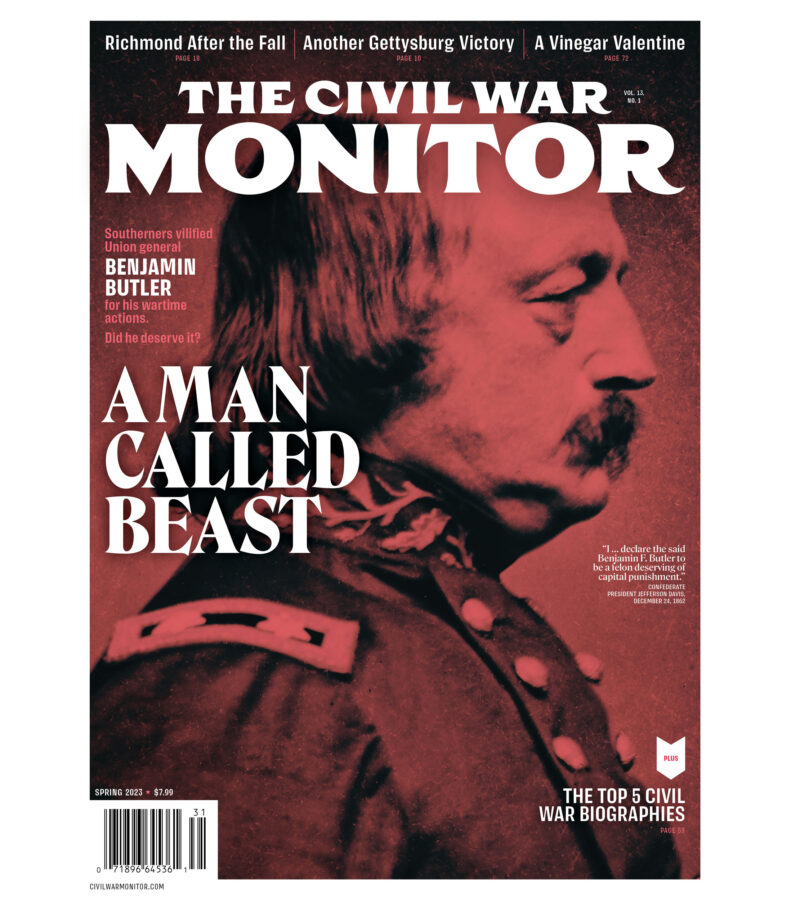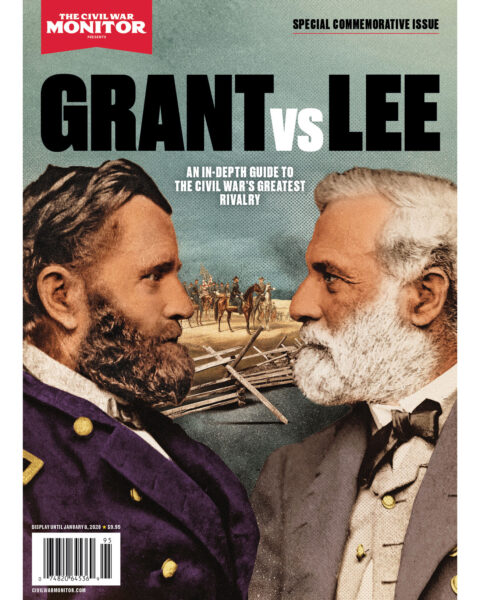
RETHINKING “BEAST” BUTLER
Kudos on your interesting and stimulating Spring 2023 issue! And particular praise for Elizabeth Leonard’s article on Benjamin Butler [“A Man Called Beast,” Vol. 13, No. 1]. It contains many insights, which I am looking forward to exploring further in her book. Yes, Butler was only human; and, as Leonard mentioned, he had “foibles” as well as virtues and strengths. However, may I suggest that Butler might have given further thought before issuing the “Woman Order”? Two of the foibles not mentioned by Leonard might include a flashfire temper and a possible penchant for knee-jerk reactions. As a retired police chief, I learned early on, through my own tactical errors, to consider all possible ramifications before taking action on potentially explosive issues. Of course, 20-20 hindsight and second-guessing from a later era are easy and unfair. But I have to wonder why Butler didn’t simply address the individual spitting offenses that prompted the Woman Order by arresting and booking the offending women for assaulting military personnel. And while doing so, treating them in as humane a fashion as possible—quick release and later trial in civil court or military tribunal if civil courts had been destroyed by the war. There still would have been a negative reaction from the community, but not nearly so explosive as when Butler threatened to treat such women as prostitutes! Sure, the offenders were jerks, but what a terrible visual Butler created, which further enflamed New Orleans as well as the entire South.
Gary C. Kuncl
Exeter, California
* * *
As always, the latest issue of The Civil War Monitor is superb! I was born and raised in Alabama, and some of our folklore was about Benjamin “Beast” Butler. The last few years have seen some stuff coming out that adds another dimension to the man—including the article by Elizabeth Leonard in your fine publication.
You may find it interesting that, though I’m from the South, I hold George Gordon Meade and Ulysses S. Grant right up there with Robert E. Lee and Thomas Jackson as some of my heroes.
I’m a retired Army first sergeant—been all over the world from Germany to Japan. Some of my best friends are Yankees.
Keep up the good work. I love your magazine!
Ken Lyle
Via email
WHAT ABOUT JFK?
Greetings. Hopefully you will have received notices from other readers regarding an error in Cecily N. Zander’s otherwise excellent article “Gettysburg, Readdressed” [Vol., 12, No. 4] in the Winter 2022 issue. On page 68, Zander states “no president has ventured to Gettysburg since 1954—and no vice president since 1963….” This is incorrect. On March 31, 1963, less than eight months before his assassination, President John F. Kennedy and First Lady Jackie Kennedy traveled to Gettysburg in anticipation of the centennial of that great battle. There exists a wonderful photograph of the young president appreciating an exhibit on John Singleton Mosby—the “Grey Ghost of the Confederacy”—inside the Gettysburg National Military Park museum. (Kennedy was an advocate of “irregular warfare” and the U.S. Army’s Special Warfare Center and School at Fort Bragg is named in his honor.) JFK was more of a “history buff” than most of our presidents, so I hope you will give him due credit for having honored that pivotal battle and its patriotic sacrifices with his pre-centennial promotional visit.
Bruce J. Kennedy
Naples, Florida
Ed. Thanks very much for your letter, Bruce. We asked Cecily Zander if she cared to respond. She writes:
“Bruce Kennedy is correct that President Kennedy went to Gettysburg, but he gave no remarks. I will admit it’s a misleading sentence on my part—I should have said no president has ventured to Gettysburg to deliver a public address since Dwight Eisenhower (and no VP since LBJ). I would reiterate that the purpose of my article was to use the various presidential speeches delivered at Gettysburg to shed light on a century of memorialization efforts at the battlefield. I wanted to use speeches that were backed by the authority of the presidential office, so only included those given while each speaker was president. Eisenhower spoke during the battle’s centennial year, but was retired and much more focused on his golf game by that time!
Kennedy never gave such a speech, so there is no way for me to know how he would have honored the memory of the battle, or what his purpose for going to Gettysburg was, when it was a private, family trip. I will also note that Kennedy declined two invitations to speak at Gettysburg. The first was on Memorial Day, 1963, which is when Johnson spoke in his stead. The second was on the occasion of the Gettysburg Address centenary celebration in November 1963. This he declined because he and Johnson were committed to taking their long-planned trip to Dallas and Fort Worth, which, of course, ended in tragedy. On that score, I can promise that very few days go by that I do not think of JFK—just this morning I had to take Elm Street past the Book Depository while running an errand. I would have loved to have been able to analyze JFK’s thoughts on the battle, but a historian can only use the sources they have!
In any event, thank you for your very careful reading of the piece—I will take your note as an invitation to be more precise with my language in the future. I am always grateful to have the chance to learn from fellow enthusiasts.”
ABOUT THAT MULE
The Spring 2023 issue was outstanding—I read it cover to cover. One correction: The image of the animal head shown in the article “Figures: Beasts of Burden” is that of a burro (donkey), not a mule. I guess only we country boys know the obvious difference.
Burros are much smaller and were never used to haul wagons during the Civil War. Wild burros have devastated the deserts of the American Southwest, having overpopulated huge areas leading to a long and expensive project some years ago to capture and remove all of them from the Grand Canyon. Some have been removed elsewhere (particularly in California) where they had been used by prospectors to carry supplies in the 1900s. When most prospecting ended, the burros were simply turned loose and left to multiply by the thousands.
Ralph A. Heinz
Via email
Ed. Thanks for setting us straight, Ralph! Our apologies for the error.
ABOUT THAT LETTER
In response to the letter by Annette Castellan in the Spring 2023 issue [Dispatches: “An Unhappy Reader,” Vol. 13, No. 1], please allow me to express my continuing support for the entertaining and thoughtful material you regularly produce.
Having looked at all 47 Monitor issues, it seems to me that no more than six feature a cover story emphasizing “race, racism, and the exploits of blacks,” whereas the overwhelming number of main and supporting articles focus on traditional Civil War material (i.e., battles, leaders, and white soldiers). Apparently, however, this small percentage renders the entire magazine too “woke” (to use an overused term) for the unhappy reader’s taste.
You can’t please everyone … and some people just aren’t worth pleasing. (But I think you’re doing well!)
Daniel Cone
Marietta, Georgia
* * *
I thoroughly agree with letter writer Annette Castellan’s comments in your Spring 2023 issue about the slant The Civil War Monitor has taken. Case in point, the same issue has articles about African-American “broomstick marriages” [Fighting Words: “To Jump the Broomstick”] and whether or not Custis Lee had an African-American son [“The Touch of Tragedy”]. Both of which are totally irrelevant to the Civil War and its outcome
Ron Jacobs
Via email
* * *
As a cover-to-cover reader of The Civil War Monitor, I feel compelled to respond to Ms. Castellan’s letter in the Spring issue. It’s a lot to unpack. Perhaps she could be enticed to cite the issue(s) of the Monitor that claim that black soldiers had “singlehandedly” won the Civil War. I must have missed them. Castellan is correct that the Civil War was about so much more than race. It was also about a few wealthy planters who convinced an uneducated electorate to commit treason and fight for a “cause” that would keep whites and blacks purposely uneducated and poor. Then, when their glorious “cause” failed, they convinced whites to continue ugly racism and repression into the 20th century and beyond. Perhaps Castellan should cancel her subscription and start her own journal, which could glorify the valiant “gentlemen” who claimed to be Christians, while keeping four million people in bondage, and instigating the deaths of nearly 700,000 Americans.
Robert E. Ameele
Trabuco Canyon, California
* * *
As with other readers—though I admit I haven’t actually spoken with any of them—I was disturbed to read the letter from Annette Castellan, who criticized the Monitor for taking, by her understanding, “an increasing emphasis on race, racism, and the exploits of blacks in the Civil War.” Castellan also believes the magazine claims race “was behind every move of the Civil War.”
What magazine is she reading? I did a random, brief sampling of five Monitor issues as far back as 2013, including the most recent. Not one cover of any issue featured an image of an African American. In a magazine that limits itself to 72 pages, I saw 10–15 images of black people in a total of 360 pages. Considering what mainstream Civil War magazines used to be, I suppose that even this minuscule amount is threatening and concerning to those who chafe at African-American history. That said, I agree with her that black soldiers did not win the war all by themselves, though I do think their contribution was exceptional for the sake of everything it meant to the slaveholders’ rebellion. While shots fired from the guns of black and white soldiers were equally deadly and damaging, black men in blue uniforms meant something very different to Confederates than did soldiers of the Irish Brigade or the mostly German XI Corps.
I don’t pay much mind to the belief that black soldiers singlehandedly won the war because I know it’s not true, and I believe the Monitor knows this as well. But the reality is that too many people are still struggling to understand the agency of blacks in the Civil War and the contributions they made to crushing the rebellion, as well as gaining freedom and the rights of citizenship for themselves.
While I can’t say that I agree with everything the Monitor has done (like the advertisement supporting the myth of black Confederate soldiers in the Winter 2022 issue), I’m just glad the magazine’s editors also get the inclusion of African-American history so the story of the Civil War can be told from a more balanced perspective and more honestly by an influential publication.
Bryan Cheeseboro
Via email
Letters to the editor Email us at [email protected] or write to The Civil War Monitor, P.O. Box 3041, Margate, NJ 08402

